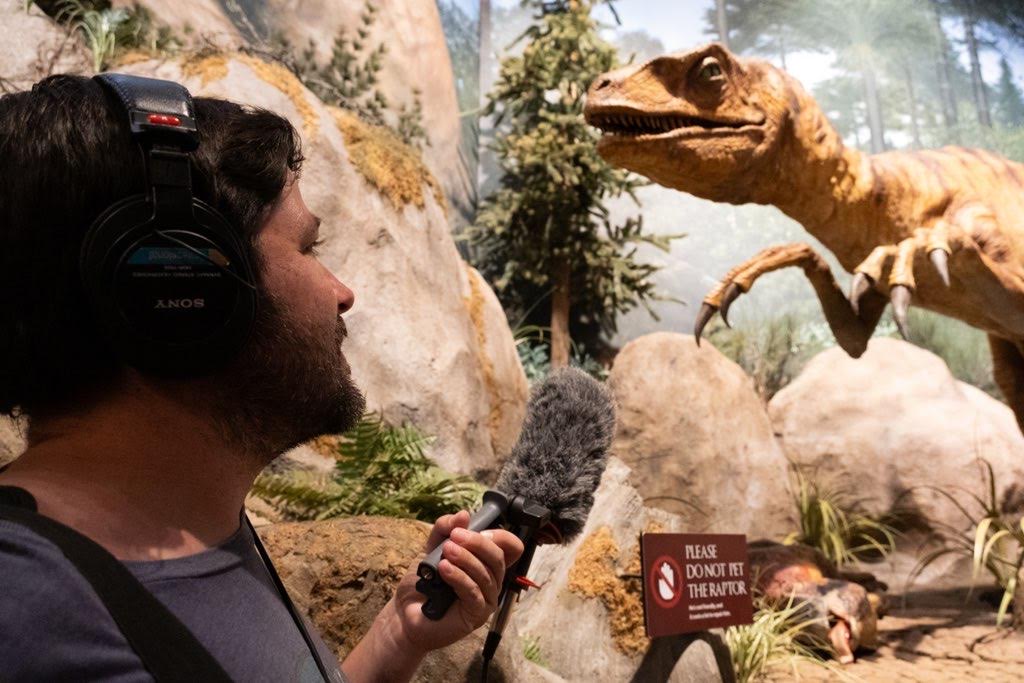Moscow — a college town that skews to the left of Idaho’s political mainstream — is an unlikely vanguard in the debate over Christian nationalism.
But the preacher of a fundamentalist church is determined to transform the politics of the Palouse, as part of a bigger campaign to make America an explicitly Christian nation. Schools are the centerpiece of Doug Wilson’s crusade.

In National Public Radio’s “Extremely American” podcast, Boise-based journalist Heath Druzin takes an in-depth look at Christian nationalism. The series focuses largely on Wilson, his Moscow-based Christ Church, and its inroads in the region’s education ecosystem.
In this email interview, we ask Druzin about what he learned — and how education is at the heart of the Christian nationalism movement.
Question: Let’s start with the basics: Who is Pastor Doug Wilson, and what is the Christ Church in Moscow? What’s the most important thing to know about both?
Answer: Doug Wilson is the 71-year-old leader of Christ Church, a fundamentalist Calvinist church and the founder of New Saint Andrews College, both in Moscow. More importantly he’s the founder of both the Communion of Reformed Evangelical Churches, or CREC, and the Association of Classical Christian Schools (ACCS). CREC has churches across the country and the world and ACCS has nearly 500 schools with roughly 50,000 students.
The most important thing to know is that he has a vision for using these to influence the country and make it more explicitly Christian. He wants to have an ACCS school within commuting distance of everyone in America. He’s not there yet but he’s making progress.
Question: Give us an overview of Moscow’s Christ Church-affiliated private schools, Logos School and New Saint Andrews College. Tell us about their origins — and their objectives.
Answer: Well, basically Doug Wilson and his wife had a daughter getting toward school age and when they looked around they realized there were no schools in the area that shared their fundamentalist beliefs. Certainly public schools were never an option for them. So Wilson started Logos with just a handful of students. But he tapped into something – there was a demand for this kind of religious education and the school grew steadily over the years.
New Saint Andrews had kind of the same origins – Wilson needed an acceptably conservative Christian college for his kids and he didn’t see any out there he liked. So he started that. New Saint Andrews has also grown quite a bit and, to the dismay of many Moscowites, taken over a prominent chunk of downtown.
Question: Doug Wilson makes no secret that he sees schools as a driving force in societal change. He even describes it all in military terms. Tell us more about that.
Answer: The most important thing to know about Doug Wilson is he believes he is in a spiritual war and that he has a vision for weaponizing Christian education and preaching to create a figurative army to change America into an explicitly Christian nation. When I interviewed him, he called his students “munitions.”
Now Wilson was in the Navy, as was his father, Jim Wilson, who wrote an influential book on evangelizing called Principles of War. So Doug Wilson says his sometimes violent language is simply drawing from his background and is 100% figurative. And it’s true, as far as I can tell, Doug Wilson has never called for actual violence. But the language certainly unsettles some people.
Question: I was really struck by the growth of Logos and New Saint Andrews. The enrollment trends were startling. Walk us through the numbers. What is driving that growth?
Answer: Logos went from 19 kids in a church basement in 1981 to 650 kids today. To put that in perspective the Logos student body is now more than a quarter the size of the entire Moscow Public School District. And Wilson took New Saint Andrews from four students in a friend’s dining room to 283 in a downtown campus.
What’s driving that is Doug Wilson’s uncompromising message and savvy media. Logos and New Saint Andrews have slick ads with thumping rock soundtracks and Doug Wilson promotes his education enterprises through his own publishing house and streaming service, Canon Press. People actually move to Moscow to be part of the “Moscow Mood,” as they call it. This fundamentalist community doesn’t shy away from ideas like women needing to be subservient to men and Christianity needing to play a bigger role in government.
Question: Is this growth unique to Moscow, or is it something that is replicated, or could be replicated, elsewhere?
Answer: Oh no, it’s happening around the country. Moscow is just the headquarters and I do think people are drawn there in particular because Doug Wilson is there and the kind of mothership of this movement is headquartered there. But Wilson’s “Christian Industrialist Complex,” as my reporting partner James Dawson coined it, is growing rapidly across the country and even internationally.

Question: Despite the student numbers, the Christ Church hasn’t succeeded in its political goals. It hasn’t been able to flip local elections. How much of a force is the Christ Church in local politics and business. Is Moscow now a town divided?
Answer: In business, it’s a huge force. In politics, not so much. In the podcast we give a sense of their business heft. James Dawson went through property records and figured out that at least 20% of downtown buildings are owned by Christ Church, its members or affiliate church members. And they own some of the most prominent historic buildings downtown. It’s very noticeable when you’re walking around downtown.
And their members have opened a ton of businesses, especially downtown. There’s this palpable divide when you are down there, between the Kirkers, as Christ Church members call themselves, and everyone else.
But Moscow is still a liberal town. For every Christian nationalist you see downtown, there’s still like four or five Pride flags and Black Lives Matter placards. So, Kirkers are far from the majority and they’ve lost just about every election they’ve run in. Part of the problem for them, too, is that many church members live outside the city limits, in the county, which means they can’t run for office in Moscow or vote in city elections.
But there’s a new housing development in town being built by a prominent Kirker and there’s some concern that it could bring a lot more church members inside the city limits to potentially run for office.
Question: And I guess I’m struck that all of this is happening in Moscow, of all places. This is a college town, and not one of Idaho’s historic conservative stronghold. So why Moscow? And what does that say for the appeal of Christian nationalism in other communities in Idaho and the nation?
Answer: Doug Wilson’s father had a vision for taking over towns in the name of Christianity and Doug Wilson has followed his lead. Basically you want a place that’s small enough to be winnable but large enough to matter. With 26,000 people and Idaho’s flagship public university, Moscow is right in that sweet spot.
In a way, the Wilsons really picked a tough challenge with Moscow, given how liberal it is. Frankly, they might have had better luck in a few other Idaho towns or next door in Eastern Washington.
As far as the appeal, one thing holding these guys back is the simple fact that their ideas are deeply unpopular with the general population. They literally want to disenfranchise women. They want to criminalize being gay. They want America to be a theocracy where non-Christians can’t even run for office. It’s 2024, that just doesn’t fly with most people, even most conservatives.
But these guys are patient and they are working on changing things one community at a time, while simultaneously getting their ideas more mainstreamed with elected officials in high places. Project 2025 is a great example. That’s basically a Christian nationalist blueprint for America. And if Donald Trump gets elected, he’s likely to appoint a lot of Christian nationalists to his administration. And that’s a way to gain power and influence without having to directly win an election.
Question: What surprised you most during your research in Moscow, and elsewhere? What did you learn about Christian nationalism that has been misunderstood — or just missed outright?
Answer: I always knew that Christian nationalists believed in the idea of patriarch – that men should be leaders and women should follow – but I didn’t realize that it’s basically the foundational idea of the movement. To them, without a patriarchal society, everything falls apart and it’s really the most important thing to them. Almost every Christian nationalist I spoke with wants to repeal the 19th Amendment, the one that guaranteed women the right to vote. I guess I’m naïve, but that was even more radical than I had imagined.
The other thing is how small tent Christian this strain of Christian nationalism is. They really only want to deal with a narrow slice of fundamentalist protestants who share their views. If you’re Catholic or Mormon, for example, you don’t really fit into their ideal society, at least not as someone with full citizenship. That’s to say nothing of non-Christians, of course.
So, in a Christian nationalist America, statistically speaking, anyone reading this is likely to be in the out group. You’d either lose voting rights or the ability to hold office or, in the case of the LGBTQ community, you’d lose the right to live your life openly.
